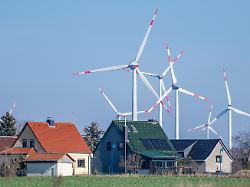Heating concepts until the end of 2026
Traffic lights agree on heat planning law for the time being
5/30/2023 9:57 p.m
The heat transition is one of the most important projects to achieve climate neutrality in Germany by 2045. The SPD politician Klara Geywitz now wants to initiate a heat planning law. After resistance from FDP-led ministries, the traffic light is said to have now been agreed.
According to the Ministry of Construction, the traffic light coalition has agreed in principle on a law for municipal heating plans. The previously controversial draft will be sent to the federal states and associations for a hearing on Wednesday, said a ministry spokeswoman. “The previous dispatch objection during the departmental vote has been lifted.” FDP-led ministries had previously reported concerns. Now this draft, which is closely linked to the also controversial heating law, “can be discussed in a reasonable time,” according to the Ministry of Building led by SPD politician Klara Geywitz.
The Heat Planning Act obliges the federal states and local authorities: In the coming years, they should present concrete plans on how they want to convert their heating infrastructure to be climate-neutral. For large cities, these heat plans should be ready by the end of 2026, smaller cities should have two years longer. To this end, network operators and industrial companies, among others, are to provide data on energy sources and consumption.
The heating plans of the municipalities should be an important orientation for citizens, because they find out whether their house will soon be connected to a district or local heating network – or whether they should convert their heating to a heat pump in the foreseeable future.
Geywitz refers to Bavarian law
The German Association of Towns and Municipalities had already warned that the acute lack of staff in the municipalities could endanger the project. Managing Director Gerd Landsberg warned that a third of the workforce would leave by 2035. “That will also be a stumbling block for municipal heat planning,” he told the “Bild” newspaper.
The opposition criticized the traffic light plan as unrealistic. “After the heating hammer comes the green heating pillory,” said CSU General Secretary Martin Huber. By collecting data on the heating habits of citizens, the Greens wanted to create a “bureaucratic monster”. However, the SPD-led Ministry of Construction is in charge of the law.
Minister Geywitz defended herself against the criticism on Twitter. She refers to the climate protection law from the CSU-governed Bavaria. Article 6 provides that detailed data on heating is already being collected with the help of the district chimney sweeps. This includes the type, fuel, nominal heat output, age of the system, information about its operation, location and address.
